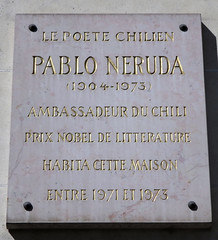Pablo Neruda


Pablo Neruda
(1904-1973)
poet, politician, ambassador (1970-1972), and Nobel Literature Laureate (from 1971)
Commemorated on 1 plaque
Le poete chilien Pablo Neruda (1904-1973), Ambassadeur du Chili, Prix Nobel de Litterature, habita cet maison entre 1971 et 1973.
English translation: Chilean poet Pablo Neruda (1904-1973), Ambassador of Chile, Nobel Laureate of Litterature, lived in this house between 1971 and 1973. [AWS Translate]
2 avenue de La Motte Piquet, Paris, France where they lived (1971-1973)

